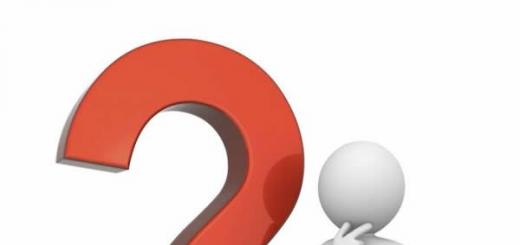To your attention, dear visitors of the site of psychological assistance website, it is proposed to pass the most popular and sought-after psychological test for the nature of a person's personality online and for free.
This character test is based on the test method for determining character accentuation according to Leonhard and determines 10 scales of accentuations corresponding to a person's psychotype, showing many personality and temperament traits.
The online personality test consists of 88 questions that must be answered with "YES" or "NO".
Test to determine the nature of a person's personality online
Instruction to the online test to determine the nature of a person's personality:
Important- answer the questions of the person's test quickly, without thinking - what comes to mind first. Then the results will be correct.
Your leading accentuated character will be determined by the highest score (24 points in total for each psychotype)
Pass a character test
You can take the test and find out your character absolutely free of charge, online and without registration.
You can view the entire printed text of the test, without a computer program, and independently calculate the points and determine your accentuation, you can
Sanguine is sociable and mobile
It is easy to distinguish from owners of other types of temperament. This is usually a sociable person who easily adapts to the situation. He is mobile, he has an expressive facial expression. In a sanguine person, mental processes change easily and quickly, so overwork almost never threatens him. Sanguine easily converges with people and calmly parted with them. He copes well with any negotiations, but is much less successful in matters that require perseverance and constant effort. The processes of excitation and inhibition in sanguine people are balanced.Phlegmatic - not lazy at all
In a phlegmatic person, mental processes arise and change slowly. The owner of this type of temperament is generally characterized by low activity. He does not rebuild too quickly, does not adapt well to the changed situation. It takes him quite a long time to do this. Outwardly, his temperament is manifested in the fact that the phlegmatic is inactive, speaks slowly, his facial expressions are inexpressive. It is not easy to get him out of patience, but the one who succeeds usually regrets it very much later, because it is as difficult to stop a phlegmatic person as it is to excite him. A characteristic feature of all owners of this temperament is perseverance, perseverance, the desire to bring what has been started to completion. The phlegmatic is a reliable life partner and business partner who usually strictly adheres to the terms of the agreement.Choleric - a person who is addicted
In a choleric, mental processes arise and change rapidly. This is a quick-tempered, but quick-witted person. He gets carried away easily, but just as quickly loses interest if he fails to achieve instant success. However, the choleric, thanks to his assertiveness and desire to put all his efforts into what interests him, often achieves excellent results. He is sharp in communication, initiative, energetic, but a stormy burst of activity is very quickly replaced by indifference. Excitation in the choleric prevails over inhibition.Melancholic focused on experiences
Melancholic refers to weak psychological types. He is prone to overly deep feelings even when there seems to be no reason for this. His feelings are stable, but outwardly they almost do not manifest themselves. In the owner of this type of temperament, inhibition prevails over excitation. The slightest resistance unsettles. He is characterized by timidity and indecision, he is very vulnerable. Owners of this type of temperament prefer individual work to collective work.What makes us so different from each other? Why are we different?
The behavior and fate of a person is influenced by his upbringing, development, tastes, and also such an important parameter as temperament.
What is temperament, how and why to define it? These are special innate qualities that do not change throughout life and create the general behavioral background of a person.
Temperament does not affect tastes, preferences, life goals. Rather, it determines reactions to any external or internal events, as well as the type of behavior.
 For example, a person is standing near the road in rainy weather, and a passing car pours water on him. One will begin to swear with the most nasty words, cursing the driver. The other will be upset, but will not show it - rather, he will hold a grudge deep inside.
For example, a person is standing near the road in rainy weather, and a passing car pours water on him. One will begin to swear with the most nasty words, cursing the driver. The other will be upset, but will not show it - rather, he will hold a grudge deep inside.
The third will not pay attention to the incident at all, and the fourth will only laugh at this curiosity. It is precisely this behavior that directly depends on the type of temperament.
Determining the type of temperament is very important, because it will allow you to better understand yourself, make meaningful decisions in life situations, treat your life consciously.
The test will not let you make a mistake!
Before defining your own type, it is worth understanding what they are and what are their features. There are only four of them: melancholic, choleric, phlegmatic and sanguine.
melancholic
This is a deeply vulnerable person, inclined to experience problems inside, destroying himself. Such a problem as “they don’t like me”, “they don’t understand me” is about him.
The melancholic is an absolute introvert, it is difficult for him to be in the spotlight, he often changes his mood and is prone to depression. Main qualities:
- Closure.
- Vulnerability.
- Discretion.
- Distrust.
- Pessimism.
This does not mean that the melancholic is a gloomy snob, but he is more prone to quiet, depressive states than others, cannot bring aggression out, and keeps everything in himself.
Phlegmatic person
It is well known that a person is phlegmatic - rather peaceful, friendly and positive, but he never shows bright emotions.
He is a reliable and calm person. Its qualities:
- Discretion.
- Hardness.
- Calm.
- Attentiveness.
- Inertia.
- Kindness.
These are good qualities, which, perhaps, just lack a little emotionality. Such a person will never exclaim: “I love you!” - rather, he will show it by deed or whisper in his ear.
Choleric
This is an aggressor and at the same time a big entertainer. Choleric is an active, nervous person, he cannot sit in one place.
It depends on upbringing and fate whether he becomes a screen star or a serial killer, but he will never remain in the shadows. Such a person as a choleric has the following qualities:
- Impermanence.
- Nervousness.
- Activity.
- Emotionality.
- Impulsiveness.
sanguine
This is a “zhivchik”, nature is positive and cheerful. Luck smiles at him, others love him, and troubles bypass him.
And he solves problems easily and playfully. The most striking signs of sanguine:
- Cheerful disposition.
- Carelessness.
- Sociability.
- Optimism.
- Kindness.
Test: determine your type
A simple and quick temperament test will allow you to determine your type online. To do this, select only one answer in each proposed question, and write the chosen letter under the corresponding question number.
As a result, this or that letter will be repeated more often. According to it, you will determine your predominant type of temperament.
So, let's start the test, what type of temperament do you have.
1. Your strengths:
A) rationality.
B) balance.
B) activity.
D) positivity.
2. Your shortcomings:
A) indecisiveness.
B) passivity.
B) inconsistency.
D) frivolity.
3. What mood are you in most often?
A) Pessimistic.
B) calm.
C) restless, changeable.
D) good.
4. How sociable are you?
A) uncommunicative.
B) uncommunicative.
C) moderately sociable.
D) Very sociable.
Find out the results:
BUT - . Your dominant temperament type indicates that it is difficult for you to enjoy life and solve problems. You often "hang out" in adverse situations and can survive them for years.
You are advised to choose a field of activity where there is a minimum of negative and a maximum of good - to work with animals or flowers, and not in the police, for example. You are shown creativity and any creative activity.
G - . You are lucky: sanguine people are considered the happiest. Direct your potential in a good and right direction: help people, give them positive and belief that life is beautiful.
Whatever you do in life, you can make the world around you brighter and brighter. And how not to use such talent!
Please note that there are practically no “pure” temperaments. Watch yourself, try to understand what type of temperament prevails in you and how to live in perfect harmony with yourself.
If you are interested in learning more
There are much longer and more complex tests that will also help determine the type of temperament of any person. One of the most popular is a test for determining temperament, a psychiatric scientist who first created a classification of types.
This test consists of many questions and contributes to a fairly accurate determination of the type of human temperament. You can take the Eysenck psychological test online completely free of charge, for this you just need to find it on the Web, it is in the public domain.
However, the Eysenck online test gives a one-sided answer, that is, it determines one, the main type of temperament. As a rule, one psychological type predominates in a person, and some second one approaches it in percentage terms.
The temperament test, or online Eysenck test, allows you to determine the type of temperament, but does not explain in detail what this classification is based on. But it is better to know the main theoretical provisions before determining the type - this will allow you to better understand your own psychology.
This means that it is correct to act in various life situations, choose the appropriate field of activity and social circle, live in a natural, natural rhythm that will correspond to the type of temperament.
Author: Vasilina Serova
Hans Eysenck's online temperament type test also measures two personality parameters:
Extraversion/Introversion and Neuroticism/Stability. Together with 1 of the 4 personality types (sanguine, choleric, phlegmatic, melancholic), they provide great diversity in the manifestation of individual characteristics.
The test includes 57 non-repetitive yes-no questions. The test includes a lie scale that reveals distortions in the answers. The objects of measurement of the test are Extraversion-Introversion and Neuroticism-Stability.
Instructions: determine the type of temperament according to Eysenck
When completing the online Eysenck temperament test, you get three scales:
- "Scale of Lies" - includes a maximum of 9 points. Measures how socially desirable your responses are. Those who scored 5 or more on this scale may try to avoid honest answers because of the desire to be socially acceptable.
- The Extraversion scale has a maximum of 24 points and measures how extroverted you are.
- The Neuroticism scale includes a maximum of 24 points and changes the degree of yours.
To interpret the scores, the E and N scales are plotted on a chart from which you can read your personality characteristics. The closer you are outside the circle, the more vivid personality traits. Please note that this online test is a very simplified scale. Therefore, if it turned out that the test showed something completely different from what you thought, then you are more likely right, and the test is wrong.
These are questions about the way you behave, react, and feel. Each question has two answer options - Yes or No. Try to determine if your usual response is closer to Yes or No. Answer quickly, do not spend too much time on each question, the first spontaneous reaction in the answer is usually the most accurate. It will take you no more than a few minutes to complete the test. Make sure you don't miss any of the 57 questions on the Eysenck Temperament Test. Start now, fill out quickly and don't miss out! There are no right or wrong answers and this is not a test of intelligence or ability, just a test of how you carry yourself.
Choleric, sanguine, phlegmatic, melancholic - what is it?
These are 4 main temperaments that characterize the types of personality behavior.
Hippocrates (5th century BC) described four types of temperament, determined by the fluid that supposedly predominates in the body: sanguine (from Latin sanguis - blood), choleric (from Greek chole - bile), phlegmatic (from Greek phlegma - mucus) and melancholy (from the Greek melaina chole - black bile). Temperaments were understood by Hippocrates in a purely physiological sense.
Theoretical basis
 Reactions of people of different types of temperament in the same situation (Figure X. Bidstrup)
Reactions of people of different types of temperament in the same situation (Figure X. Bidstrup) G. Eysenck, after analyzing the survey materials of 700 neurotic soldiers, came to the conclusion that the entire set of traits describing a person can be represented by 2 main factors: extraversion (introversion) and neuroticism.
The first of these factors is biopolar and represents a characteristic of a person's individual psychological make-up, the extreme poles of which correspond to the personality's orientation either to the world of external objects (extraversion) or to the subjective inner world (introversion). It is generally accepted that extroverts are characterized by sociability, impulsiveness, flexibility of behavior, great initiative (but little perseverance) and high social adaptability. Introverts, on the contrary, are characterized by lack of communication, isolation, social passivity (with sufficiently high perseverance), a tendency to introspection and difficulties in social adaptation.
The second factor - neuroticism (or neuroticism) - describes some property-state that characterizes a person in terms of emotional stability, anxiety, self-esteem level and possible autonomic disorders. This factor is also bipolar and forms a scale, on one pole of which there are people who are characterized by extreme stability, maturity and excellent adaptation, and on the other - an extremely nervous, unstable and poorly adapted type. Most people are located between these poles, closer to the middle (according to the normal distribution).
The intersection of these 2 bipolar characteristics allows you to get an unexpected and rather curious result - a fairly clear assignment of a person to one of the four types of temperament.
Interpretation of test results
Extraversion / Introversion:
- more than 19 - a bright extrovert,
- more than 15 - extrovert
- 12 - average value,
- less than 9 - introvert,
- less than 5 - a deep introvert.
Neuroticism/Stability:
- more than 19 - a very high level of neuroticism,
- more than 14 - a high level of neuroticism,
- 9 - 13 - average value,
- less than 7 - low level of neuroticism.
Lie:
- more than 4 - insincerity in the answers, which also indicates a certain demonstrative behavior and orientation of the subject to social approval,
- less than 4 is normal.
Presentation of results by scales extraversion and neuroticism carried out using a coordinate system. The interpretation of the obtained results is carried out on the basis of the psychological characteristics of the individual, corresponding to one or another square of the coordinate model, taking into account the degree of severity of individual psychological properties and the degree of reliability of the data obtained.
Drawing on data from the physiology of higher nervous activity, Eysenck hypothesizes that the strong and weak types, according to Pavlov, are very close to the extroverted and introverted personality types. The nature of introversion and extraversion is seen in the innate properties of the central nervous system, which ensure the balance of the processes of excitation and inhibition.
Thus, using survey data on the scales of extraversion, introversion and neuroticism, we can derive temperament indicators personality according to Pavlov's classification, who described four classical types:
- sanguine(according to the main properties of the central nervous system, it is characterized as strong, balanced, mobile),
- choleric(strong, unbalanced, mobile),
- phlegmatic person(strong, balanced, inert),
- melancholic(weak, unbalanced, inert).
Definitions of temperament types
sanguine
"Clean" sanguine quickly adapts to new conditions, quickly converges with people, sociable. Feelings easily arise and change, emotional experiences, as a rule, are shallow. Facial expressions are rich, mobile, expressive. He is somewhat restless, needs new impressions, regulates his impulses insufficiently, does not know how to strictly adhere to the established routine, life, and work system. In this regard, he cannot successfully carry out a task that requires an equal expenditure of effort, a long and methodical effort, perseverance, stability of attention, and patience. In the absence of serious goals, deep thoughts, creative activity, superficiality and inconstancy are developed.
Choleric
Choleric characterized by increased excitability, actions are intermittent. This type of temperament is characterized by sharpness and swiftness of movements, strength, impulsiveness, and a vivid expression of emotional experiences. Due to imbalance, carried away by business, he is inclined to act with all his might, to be exhausted more than he should. Having public interests, temperament manifests in initiative, energy, adherence to principles. In the absence of spiritual life, the choleric temperament often manifests itself in irritability, efficiency, intemperance, irascibility, inability to self-control under emotional circumstances.
Phlegmatic person
Phlegmatic person characterized by a relatively low level of activity of behavior, new forms of which are developed slowly, but are persistent. It has slowness and calmness in actions, facial expressions and speech, evenness, constancy, depth of feelings and moods. Persistent and stubborn "worker of life", he rarely loses his temper, is not prone to affects, having calculated his strength, brings the matter to the end, is even in relationships, moderately sociable, does not like to talk in vain. Saves energy, does not waste it. Depending on the conditions, in some cases, a phlegmatic person can be characterized by “positive” traits - endurance, depth of thought, constancy, thoroughness, etc., in others - lethargy, indifference to the environment, laziness and lack of will, poverty and weakness of emotions, a tendency to fulfill just habitual actions.
melancholic
melancholic. His reaction often does not correspond to the strength of the stimulus, there is a depth and stability of feelings with their weak expression. It is difficult for him to concentrate on something for a long time. Strong influences often cause a prolonged inhibitory reaction in a melancholic (hands down). He is characterized by restraint and muffled motor skills and speech, shyness, timidity, indecision. Under normal conditions, a melancholic is a deep, meaningful person, can be a good worker, successfully cope with life's tasks. Under adverse conditions, it can turn into a closed, timid, anxious, vulnerable person, prone to difficult internal experiences of such life circumstances that do not deserve it at all.
Sources:
- EPI personality questionnaire (method of G. Eysenck)/ Almanac of psychological tests - M., 1995. S.217-224.
Volikov's character test is a scientifically based, patented program, as evidenced by a patent issued by the Federal Service for Intellectual Property and protected by copyright. You can pass this test only on our resource and absolutely for free.
The author of the test, graduated from the Department of Theoretical Physics of MISiS, therefore this test was based on hundreds of numerical matrices, in which numbers are various astronomical parameters, for example, the distances between the planets, their sequence, the angles they form, etc.
PATENTED VOLIKOV'S CHARACTER TEST
Preamble
This test shows the character of a person laid down at birth, its main features. It does not take into account external factors that influence the formation of a person in the process of growing up.
Passing the Volikov character test will help you understand what exactly is characteristic of you, what hinders you, what you need to try to change, and what qualities to develop in yourself in order to succeed in life. Personality Test you can go only on our resource and completely for free.
It is extremely important to indicate the exact (+ - 20 min) time and place of birth. This greatly improves the accuracy of the online character test result. If only the date of birth is known, the program will assume that the time of birth is noon, i.e. 12 noon local time. The accuracy of the Volikov test result will depend on how much the real time of birth differs from the conditional (from 12 hours). The closer a person's actual birth time is to noon, the more accurate the character test result will be.
The traits that make up a person's character are represented on a scale from -5 to +5, where the value "0" is either the norm of a character trait, or the average value for most people. Values from -1 to -5 are colored red on the chart, values from 1 to 5 are colored green on the chart. Coloring a chart in red is not always a "negative" indicator of character, just as coloring a chart in green is not always a "positive" indicator of character. It just shows the amount of deviation of the indicator in one direction or another from "0", that is, the average value of this indicator for most people.
Diagrams of character traits show the potential inherent at birth. And they do not take into account genetic factors, upbringing, education, living conditions, the influence of the environment, etc., which, of course, affect the formation and manifestations of the personality of any person. This must be taken into account when analyzing and evaluating the results that the Volikov character test gives.
It is worth paying special attention in cases where the result for some characteristics is close to the extreme values of -4; -5 or 4; 5. In this case, there is a possibility of clinical (medical) manifestations of this quality of character.
For example: a score of 4 or 5 for the parameter "courage" can manifest itself in some people not only as reckless courage, but also as aggressiveness or sadism. Or, for example, score 4; 5 for the “will” parameter can manifest itself in some people not only as “unshakable will”, but also as tyranny, despotism, the need for domination.
Analyze the results of the Volikov character test in aggregate, taking into account the relationship between different character traits, the same traits will manifest themselves in completely different ways, for example, with different intellectual abilities or courage. For example, will at +5 intelligence efficiency will be used more constructively, and at -5, more destructively.
It must be understood that in all indicators of character, not all possible manifestations are indicated, but only the main ones, respectively, these meanings can be expanded and developed with various synonyms, for example: for pride, synonyms are arrogance, arrogance, arrogance, or for hostility, malice, callousness are synonyms; a synonym for tact can be diplomacy, politeness, correctness; synonyms for excessive emotionality can be touchiness, sentimentality, vulnerability.
Be sure to accurately indicate the time (and not just the date) of birth, if you know it with an accuracy of at least 20 minutes or 2 hours, and also choose your place of birth from the list of cities - this greatly increases the accuracy of the forecast.
The Volikov character test is a highly complex organism that consists of hundreds of numerical matrices that analyze the highly contradictory factors that affect us. Therefore, it is impossible to get a perfectly accurate result for all 21 character traits. According to our observations, as a rule, out of 21 character factors, 18-19 fairly accurately reflect the character of a person (with known time and place of birth). The remaining 2-3 factors of a person's character may differ by several points.











